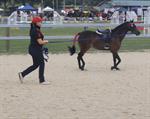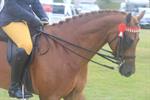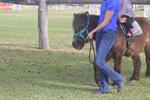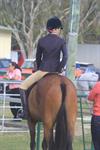 Study Equine Behaviour - Understand what motivates the behaviour of your horse
Study Equine Behaviour - Understand what motivates the behaviour of your horse
Are you interested in understanding why horses behave the way they do?
Are you interested in learning about effective training and care of horses?
Then this is the course for you.
The equine behaviour course requires 100 hours of study and considers -
- motivation and influences on equine behaviour
- genetics and evolution effects on behaviour
- equine perception
- social behaviour in horses
- communication in horses
- equine sexual and reproductive behaviour
- learning and training
- behavioural problems in horses
This course is suitable for anyone who owns or cares for horses. In particular, it may be of interest to people who want to work in the following areas or improve their career prospects in these areas -
- stable hands
- horse trainers
- stable owners
- equine school staff
- equine writers/journalists
The study of equine behaviour provides a foundation for more sensitive and informed care and training of horses. Lessons cover genetics, perception and behaviour, communication and social behaviour, sexual and reproductive behaviour, learning and training and behavioural problems. Anyone who works with horses will get value from completing the course. Horses are large animals in relation to their human trainers and they cannot be trained safely or effectively using brute force. Having a deeper understanding of equine behaviour and intelligence will allow you to minimise the frustration you may often feel when trying to handle your horse.
Student Comment: "[The course] was more indepth than I thought it would be and it was information that I could apply with my own horses. The feedback was very helpful and it was information that could only have been gained from experience with horses. She would always answer any questions that I have and always had something positive and helpful to say!" Paula Grima - Equine Behaviour course
COURSE CONTENT
 There are 7 lessons in this course:
There are 7 lessons in this course:
- Introduction: Influences and motivation
- Why study equine behaviour?
- What motivates behaviour?
- Reactive behaviour
- Active behaviour
- Cognitive behaviour
- Species behavioural differences
- Learned behaviour
- Classical conditioning
- Stimulus conditioning
- Trace conditioning
- Delayed conditioning
- Operant conditioning
- Terminology
- Genetics and Behaviour
- Understanding the basics
- Heritability
- Epigenesis
- Innate behaviour
- Selective pressures
- Social Behaviour
- Rank
- Conflict
- Equine Perception and Behaviour
- Imprinting
- Negative imprinting
- Sensory reception
- Mechanoreceptors
- Thermoreceptors
- Chemoreceptors
- Photoreceptors
- Stimulus filtering
- Communication and Social Behaviour
- Social Constraints
- Herd Membership
- Auditory signals
- Chemical signals
- Communication
- Co-ordination
- Cohesion
- Sexual and Reproductive Behaviour
- Sexual encounter
- Isolating mechanisms
- Birthing behaviour
- Foal imprinting
- Maternal behaviour
- Abnormal behaviour
- Learning and Training
- Conditioning and learning
- Shaping
- Extinction
- Habituation
- Instrumental Learning
- Thorndike’s Law of Effect (1913)
- Operant and Respondent Behaviour
- Pseudo-conditioning
- Intero-ceptive Conditioning
- Temporal Conditioning
- Biological Aspects of Learning
- Associative Learning
- Obedience
- Reinforcement
- Punishment
- Systematic desensitisation
- Counter conditioning
- Behavioural Problems
- Types of Abnormal Behaviour in Horses
- Diagnosing Behavioural Problems
- Indicators of Pain
- Indicators of Mild Fear
- Indicators of Extreme Fear
- Stress
- Stereotypes
- Stable Vices
- Prevention
- Ridden Vices
- Handling Vices
- Problems during loading
There is an assignment at the end of each lesson, which you submit to your tutor for marking.
Our tutors are all highly experienced and well qualified in the equine field and are happy to help you with any queries throughout the course.
Aims
-
Identify factors affecting equine behaviour.
-
Describe the influence of genes on equine behaviour.
-
Explain how horses perceive and how they respond to various stimuli
-
Explain how horses communicate and the nature of their social organisation.
-
Explain the sexual and reproductive behaviour of the horse.
-
Describe the different ways that horses learn and how this can be applied to the training environment
-
Explain how and why behavioural problems occur and how they can be prevented
Why Do Horses Behave as they Do?

Horses are naturally herd animals, and their instinct to be part of a herd is along with other "genetic" characteristics; a major influence on their behaviour.
Equine behaviour is however also affected by things that the horse learns throughout the course of their life; and these learned behaviours will shape every horse into an "individual" that thinks and acts in at least some respects; differently to the way other horses behave.
Other Influences
Behaviour is also affected by a horse’s biological/physiological condition.
When a horse is sick, it may act differently. When its physiological systems or internal chemistry is abnormal, its behaviour may also become abnormal.
There are associations that occur between the physiology and the psychology of an horse.
For example: chemical processes such as the response to different types of foods, can affect the psychological state (i.e. animals may think differently when they are starved.) When horses become stressed, blood vessels may contract and the heart rate may increase.
In studying equine behaviour, we focus on two broad areas of concern:
- The way the body’s physiology responds to external stimuli
- The way the body’s internal environment can affect the animal’s behaviour

External stimuli that can affect behaviour include:
- Stimuli to sensory organs
- Dysfunction of sensory organs.
Internal influences on behaviour can include:
- Different foods (including nutritional deficiencies or disorders)
- Secretions of Glands
- Metabolic Products
- Blood and Lymph constituents
- Chemicals manufactured in the body and brain
- Dysfunction of body systems (pain may or may not be a symptom)
- Neuro-emotional Blockages
Physiological Responses to Psychological Stimuli:
Physiological characteristics can be seen to change when a horse’s state of mind is stimulated in some way. Here are some examples:
- A horse is feeling tired, lays down and observes surrounding activity, then becomes more alert / awake.
- If the horse lies down in a dark, quiet place, they may be more likely to sleep.
- A horse sees something that is disturbing (e.g. a predator) and their heart rate increases.
If you are interested in finding out more about what makes horses behave the way they do.
If you want to improve your job and career prospects in the equine field.
Then why not enrol now on the Equine Behaviour course.
